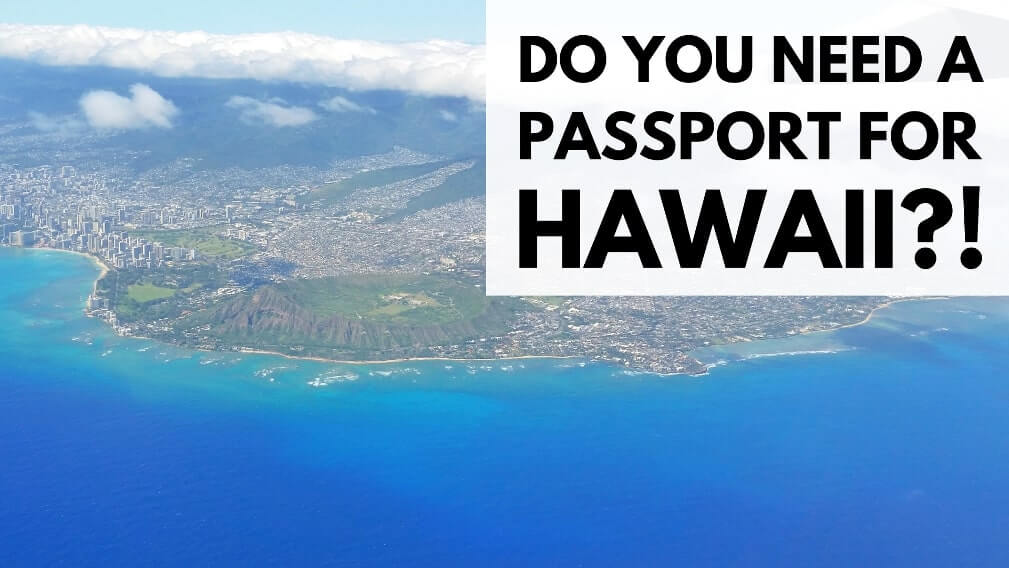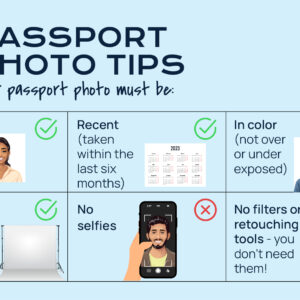If you’re planning a trip to Hawaii, you may be wondering whether you need a passport for your adventure in paradise. Fortunately, for U.S. citizens, traveling to Hawaii is just like flying to any other state within the country. Since Hawaii is part of the United States, you won’t need a passport to visit this stunning archipelago of islands. So pack your bags, grab your sunscreen, and get ready to explore the beauty of Hawaii without any worries about passports or international travel.
Documents Required for Travel to Hawaii
Hawaii, with its stunning landscapes and warm tropical climate, is a dream destination for many travelers. Whether you are a U.S. citizen or an international visitor, it’s important to be aware of the necessary documents required for travel to Hawaii. In this comprehensive guide, we will outline the various documents you may need, depending on your citizenship status and age, to ensure a smooth and hassle-free trip to the beautiful islands of Hawaii.
Passport for International Visitors
If you are an international visitor planning to travel to Hawaii, having a valid passport is an essential requirement. A passport serves as your official identification and proof of citizenship, and it grants you entry into the United States. Without a passport, you may be denied entry to Hawaii, regardless of your purpose of travel.
Identification for U.S. Citizens
As a U.S. citizen traveling to Hawaii, you have certain options when it comes to identification. While a passport is always a valid and widely accepted form of identification, there are alternative forms of identification available to U.S. citizens.
Additional Documentation for Minors
If you are traveling with minors to Hawaii, there may be additional documentation requirements that you need to fulfill. These requirements ensure the safety and well-being of the children and help protect against child abduction and unauthorized travel with minors.
Alternative Proof of Identification
In certain cases, you may not possess a passport or other government-issued identification. Fortunately, there are alternative forms of identification that may be accepted when traveling to Hawaii. These alternatives can be used to prove your identity and ensure a smooth entry into the state.
Passport Requirements for International Visitors
When it comes to passport requirements for international visitors traveling to Hawaii, it’s important to be aware of the specific regulations and exemptions that may apply.
Passport Exemption for U.S. Citizens
As a U.S. citizen, you are generally exempt from the passport requirement when traveling between U.S. states, including Hawaii. However, it’s still highly recommended to carry a valid passport or another form of government-issued identification when traveling to Hawaii, as it may be required for certain activities or in case of an emergency.
Passport Requirement for Non-U.S. Citizens
If you are a non-U.S. citizen planning to travel to Hawaii, a valid passport is generally required for entry. The passport must be valid for at least six months beyond your intended stay in Hawaii. It’s important to check the specific passport requirements for your country of citizenship, as some countries may have additional entry requirements or visa obligations.
Visa Requirements for Non-U.S. Citizens
In addition to a valid passport, non-U.S. citizens may also need to obtain a visa to travel to Hawaii. The visa requirements vary depending on your country of citizenship. It’s crucial to check with the nearest U.S. embassy or consulate in your home country to determine if a visa is required and, if so, the appropriate application process to follow.

Explore Uncharted Hawaiian Destinations
Identification for U.S. Citizens
As a U.S. citizen, you have several options for identification when traveling to Hawaii. While a passport is always recommended, there are other acceptable forms of identification that you can use.
Acceptable Forms of Identification
Apart from a passport, other acceptable forms of identification for U.S. citizens include a state-issued identification card, such as a driver’s license, or a trusted traveler program card, such as a Global Entry or NEXUS card. These identification documents must be valid and not expired.
Non-Real ID Compliant States
It’s worth noting that certain states in the U.S. are not compliant with the Real ID Act, which establishes minimum security standards for driver’s licenses and identification cards. This means that if you reside in a non-compliant state and wish to use your driver’s license as identification when traveling to Hawaii, you may need to present an alternative form of government-issued identification, such as a passport.
Real ID Act Compliance
To ensure a smooth travel experience, it is highly recommended that you ensure your state-issued identification card, such as a driver’s license, is compliant with the Real ID Act. Being Real ID compliant means that your identification card meets the necessary security standards required by the federal government.
Additional Documentation for Minors
If you plan to travel to Hawaii with minors, there are additional documentation requirements that you should be aware of to ensure a smooth and hassle-free trip.
Identification Requirements for Minors
Minors, like adults, require proper identification when traveling. For U.S. citizens, a birth certificate or a passport is generally sufficient to establish the identity of a minor. However, it’s advisable to carry a passport for each minor, as it is a universally accepted form of identification.
Consent Letters and Guardianship Documentation
If you are not the parent or legal guardian of the minor(s) you are traveling with, it is advisable to carry a consent letter from the parent(s) or legal guardian(s) granting permission for you to travel with the minor(s). This letter should include pertinent details such as the names of the minors, your relationship to them, and the duration and purpose of the trip. Additionally, if you are a legal guardian traveling with a minor, it is important to carry documentation that proves your legal guardianship status.

Plan Your Dream Hawaiian Getaway
Alternative Proof of Identification
In certain situations, you may not have access to a passport or other government-issued identification. However, there are alternative forms of identification that may be accepted when traveling to Hawaii.
Driver’s License
If you do not have a passport, a valid driver’s license issued by an appropriate government authority can serve as an alternative form of identification when traveling within the United States, including Hawaii. It’s essential to ensure that your driver’s license is not expired and meets the necessary security standards.
Military ID
If you are an active member of the U.S. military, a valid military identification card can serve as a form of alternative identification when traveling to Hawaii. This identification card should be current and in compliance with the standards established by the Department of Defense.
Permanent Resident Card
If you are a lawful permanent resident of the United States, commonly known as a green card holder, your permanent resident card can be used as an alternative form of identification when traveling to Hawaii. This card serves as proof of your status within the country and must be valid.
Global Entry or NEXUS Card
If you are a member of a trusted traveler program, such as Global Entry or NEXUS, you can use your membership card as an alternative form of identification when traveling to Hawaii. These programs facilitate expedited clearance for pre-approved, low-risk travelers and provide an additional form of identification.
Enhanced Driver’s License
Certain states within the U.S. offer enhanced driver’s licenses that comply with the Western Hemisphere Travel Initiative (WHTI), allowing for travel between the U.S. and certain neighboring countries, such as Canada and Mexico. If you possess an enhanced driver’s license from a participating state, it can serve as an alternative form of identification when traveling to Hawaii.
Traveling from Within the United States
If your travel to Hawaii originates within the United States, there are specific considerations to keep in mind regarding the necessary documents for your journey.
Hawaii as a Domestic Destination
Despite being located in the middle of the Pacific Ocean, Hawaii is considered part of the United States and is therefore a domestic destination for U.S. citizens. This means that the same identification requirements applicable for domestic travel within the United States apply when traveling to Hawaii from any state.
Fly Between U.S. States
If you plan to fly from one U.S. state to another, such as from California to Hawaii, a valid government-issued identification card, such as a driver’s license or passport, is required. This identification will be checked during the airport security process and ensures that you meet the necessary identification requirements for domestic air travel.
State ID vs. Passport
While a state-issued identification card, such as a driver’s license, is acceptable for domestic travel within the United States, it’s important to consider using a passport as your primary form of identification when traveling to Hawaii. Having a passport ensures that you have a universally recognized form of identification and can be useful in case of any unforeseen circumstances or emergencies.

Experience Hawaii’s Unique Attractions
Entry Requirements for International Travelers
If you are an international traveler planning to visit Hawaii, it’s crucial to understand the entry requirements and any additional documentation you may need.
Visa Waiver Program
Many countries participate in the Visa Waiver Program (VWP), which allows eligible travelers to visit the United States, including Hawaii, for up to 90 days without obtaining a visa. However, travelers utilizing the VWP must obtain authorization through the Electronic System for Travel Authorization (ESTA) prior to their departure.
Electronic System for Travel Authorization (ESTA)
ESTA is an online system that determines the eligibility of visitors from VWP countries to travel to the United States. It is mandatory to submit an ESTA application and receive approval before traveling to Hawaii. The ESTA is generally valid for multiple trips over a two-year period or until the expiration of the passport, whichever comes first.
Traveling to Hawaii from Other Countries
When traveling to Hawaii from countries outside the United States, it’s important to be aware of the passport requirements that may apply.
Passport Requirement for Non-U.S. Citizens
Non-U.S. citizens traveling to Hawaii from other countries are generally required to possess a valid passport. The passport must be valid for at least six months beyond the intended stay in Hawaii. It’s important to check the specific passport requirements for your country of citizenship and ensure that you have a valid passport before making travel arrangements.
Visa Requirements for Non-U.S. Citizens
In addition to a valid passport, non-U.S. citizens may need to obtain a visa to travel to Hawaii. Visa requirements vary depending on your country of citizenship. It’s crucial to check with the nearest U.S. embassy or consulate in your home country to determine if a visa is required and, if so, the appropriate application process to follow.

Travel Document Validity
Before traveling to Hawaii, it’s important to consider the validity of your travel documents and ensure that they meet the necessary requirements.
Passport Expiration Date
When traveling to Hawaii, or any international destination, your passport must be valid for at least six months beyond your intended stay. It’s essential to check the expiration date of your passport well in advance of your trip and renew it if necessary. Failure to have a valid passport can result in denial of entry to Hawaii.
Return Ticket Requirements
Although not a document in itself, having a return ticket is often a requirement when traveling to Hawaii. Immigration officials may ask for proof of onward travel to ensure that you do not overstay your permitted time in the country. It is advisable to have a return ticket or evidence of onward travel readily available when entering Hawaii.
Travel Advisories and COVID-19 Restrictions
In light of the ongoing COVID-19 pandemic, it’s important to stay informed about any travel advisories or restrictions that may impact your trip to Hawaii.
Current Travel Advisories for Hawaii
Travel advisories can provide important information regarding safety, health, and security concerns in the destination you plan to visit. It’s essential to stay updated on any travel advisories issued for Hawaii by reliable sources, such as the U.S. Department of State or the Centers for Disease Control and Prevention (CDC). These advisories may include information on COVID-19 protocols, entry requirements, and any specific restrictions or precautions in place.
COVID-19 Testing and Vaccination Requirements
Due to the ongoing COVID-19 pandemic, Hawaii has implemented certain testing and vaccination requirements for travelers. It is important to stay informed about the specific testing protocols and vaccination requirements before your trip to ensure compliance and a smooth entry into the state. This information can be obtained from official government websites or by contacting the appropriate authorities.
In conclusion, having the correct and valid documents is essential for a smooth and hassle-free trip to Hawaii. Whether you are a U.S. citizen or an international visitor, understanding the passport, identification, and additional documentation requirements will ensure that you have all the necessary paperwork before embarking on your Hawaiian adventure. Stay informed, plan ahead, and enjoy your trip to the beautiful islands of Hawaii!
